If your cat suddenly stopped eating, it can definitely be concerning. If they’re otherwise acting normal, though, it can really make you question exactly what is going on. We love our fur babies. When something isn’t right, we want to get to the bottom of the problem and get everything back to normal. If you’ve been asking, “why is my cat not eating much but acting normal,” you’ve come to the right place. Let’s take a look at the various reasons that a cat’s appetite could change.
Table of Contents
- How to Tell if a Cat isn’t Eating
- Reasons a Cat My Not Eat While Still Acting Normal
- Health Conditions that Can Affect A Cat’s Eating Habits
- Psychological or Behavioral Issues that May Affect a Cat’s Eating Habits
- Other Potential Reasons a Cat May Not Be Eating Much
- How long can a cat go without eating?
- Determining the Cause of Your Cat’s Decreased Appetite
- How to Get Your Cat to Start Eating Again
- Appetite Changes in Your Cat
- FAQs
How to Tell if a Cat isn’t Eating
If you have more than one cat, it can be a little difficult to determine if one of your cats has stopped eating. If you are questioning whether one of your cats is actually eating at all or enough, try separating your cats for a few meals and feeding them in different rooms. This will help you assess whether one of them is leaving all of their food or is actually eating some of it.
Even if your cat seems to be eating less than they previously were, they may still be consuming enough calories to stay healthy. You can contact your veterinarian to determine the minimum number of calories they need. Then, you can calculate how much they’re actually getting based on how much food they’re eating. Consider weighing their food bowl before and after they eat to find out exactly how much they ate.
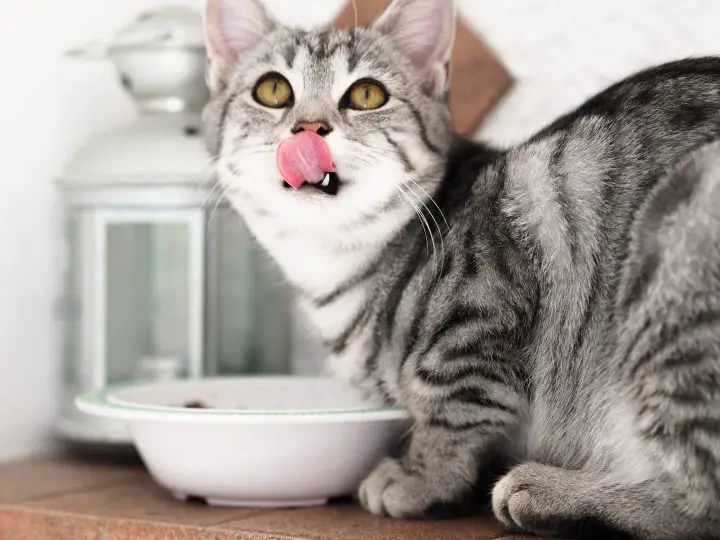
Reasons a Cat My Not Eat While Still Acting Normal
Unfortunately, pinpointing the reasons your cat isn’t eating while still acting normally isn’t a simple and straightforward task. There are actually a wide range of possible reasons that can cause this behavior in cats. In the next few sections, I’ll go into more detail about each possibility.
Health Conditions that Can Affect A Cat’s Eating Habits
If you’re asking, “why is my cat acting normal but not eating,” a medical condition could be to blame. Various health conditions can cause a cat to stop eating. If you suspect any of these health conditions explained below, you should schedule a checkup with your cat’s veterinarian.
Dental Problems
Various dental problems can cause a cat to stop eating. Gingivitis causes inflammation in the gums, which can feel very uncomfortable for a cat. If left untreated, gingivitis will progress to periodontitis, which can damage a cat’s teeth, ligaments, and tissues. Periodontitis can be very painful for cats, and many may choose not to eat because of the pain in their mouth.
If a dental disease is the reason your cat has stopped eating, a few other symptoms to be on the lookout for include: drooling, discolored teeth, lip licking, loose or missing teeth, swollen, red, or bleeding gums, or rubbing their mouth with their paws.
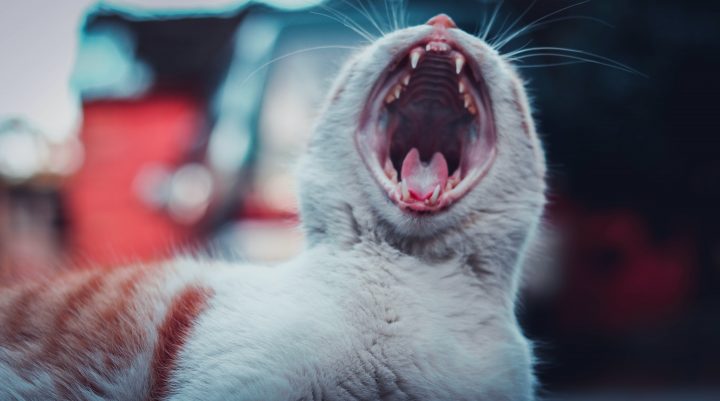
Kidney Disease
Not eating may also be a sign of kidney disease. However, this sign is often dismissed since older cats are more likely to develop kidney disease, but they are also more likely to show a normal decrease in appetite.
Kidney disease can be a very serious condition. The kidneys are important for ridding our blood of waste, keeping electrolyte levels regulated, and making urination possible. If you suspect your cat has kidney disease, schedule an appointment with their vet right away. Early diagnosis can make all the difference with this disease.
Gastrointestinal Problems
GI issues can make digesting food feel very painful for a cat. If they associate this pain with eating, the cat may choose to stop eating to prevent the painful feeling. Other symptoms of gastrointestinal issues to look out for include diarrhea, vomiting, weight loss, and lethargy.
There are a number of different gastrointestinal problems that can affect cats. Some of these include: colitis, gastritis, digestive system cancers, intestinal parasites, constipation, stomach ulcers, intestinal bleeding, IBD (inflammatory bowel disease), and gastrointestinal obstruction.
Pancreatitis
Pancreatitis, which is common in cats, can cause a decrease in appetite, loose stools, and vomiting. When the pancreas secretes enzymes, it can lead to pancreatitis if the enzymes leak into the glandular tissue. This causes the pancreas to become inflamed.
While you may see some of the symptoms shared above, some cats with pancreatitis don’t display any symptoms. Your vet will need to perform blood tests or an ultrasound to diagnose pancreatitis.
Cancer
Sadly, cats can also suffer from cancer, which can cause a loss of appetite. Lymphoma, mast cell tumors, and carcinomas are three of the most common types of cancer that cats can suffer from, though there are many other forms of cancer possible.
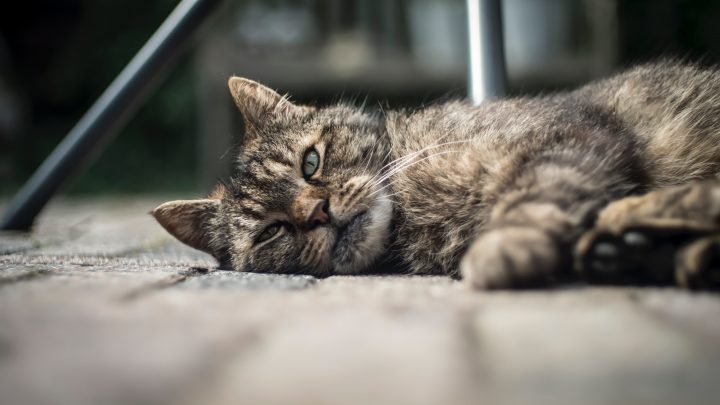
Liver Disease
Yet another possible cause of loss of appetite in cats is liver disease. Liver disease, which is often caused by another disease, causes the liver to be inflamed. Other symptoms you may see in a cat with liver disease include soft stools, weight loss, vomiting, yellowish gums, skin, or eyes, and darker urine. A vet will need to diagnose liver disease by running a blood test, taking a biopsy, or using imaging.
Hyperthyroidism
The thyroid gland in cats with hyperthyroidism secretes more thyroid hormones than are necessary. This can cause weight loss, constipation, and a higher metabolic rate. Many cats will have an increased appetite with hyperthyroidism, but some will see a decrease in their appetite. Your vet will need to perform blood tests to diagnose this condition. It is more likely to occur in cats that are at least 10 years old.
Diabetes Mellitus
Have you noticed your cat not eating but drinking lots of water? One possible explanation for this behavior is diabetes mellitus. When a cat doesn’t have enough insulin in their body or their body no longer responds to insulin, the glucose from the foods they eat is unable to get inside their cells. This means that the glucose stays in the bloodstream, causing high blood sugar.
Diabetes mellitus is often accompanied by an increased appetite. However, loss of appetite can also occur, particularly in cats with a more advanced form of the disease.
Infectious Disease
Various types of infectious diseases can also cause a cat to lose their appetite. Infectious diseases include viruses (such as feline leukemia or feline herpes), fungus (such as blastomyces or cryptococcus), bacteria (such as E. coli and staphylococcus), and parasites (such as hookworms, roundworms, and heartworms). If any of these conditions make a cat feel sick enough, it can have a negative impact on the cat’s appetite.
Orthopedic Disease
Most orthopedic diseases, such as arthritis, don’t cause a loss of appetite. However, in some cases where the condition has really progressed, the pain a cat feels can become enough to cause them to stop eating.
Additionally, orthopedic disease can also make it more challenging for a cat to get to their food. The pain of moving may be too much to take, or the cat may become too slow to compete with other kitties in the house for the available food.
Injuries and Trauma
When a cat sustains a serious injury, they may be in a lot of pain or have difficulty moving. As with orthopedic diseases, an injury may also cause a cat to stop eating if their pain is too much or they have trouble accessing their food.
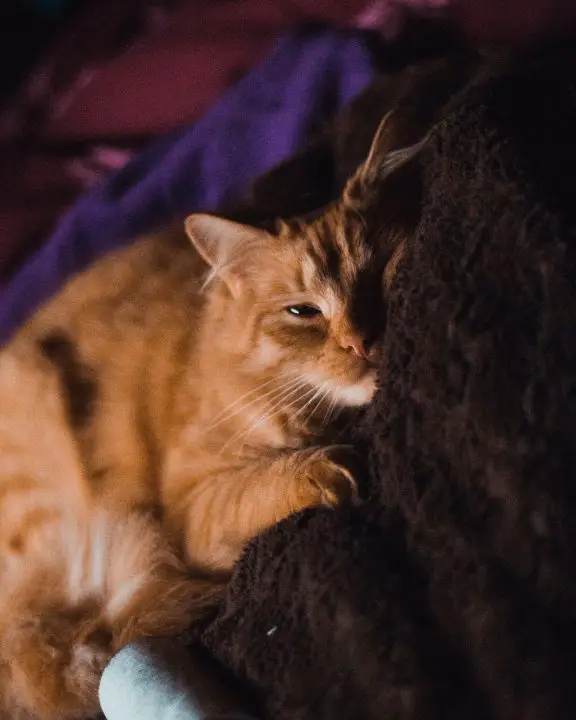
Psychological or Behavioral Issues that May Affect a Cat’s Eating Habits
In addition to physical health concerns, psychological or behavioral health issues can also cause a cat to stop eating. Your vet will also be a good resource if you suspect that any of these issues are causing your cat’s decrease in appetite.
Stress or Anxiety
Is my cat not eating because of stress? Yes, stress and anxiety are two of the possible reasons cats can stop eating. When a cat feels stressed or anxious, it can affect their body in multiple ways. These include feeling more tired than usual, unlearning how to use the litter box, and, of course, a decrease in appetite.
If you recently brought home a new kitty, you may be wondering why the new cat not eating much but acting normal. One possible explanation for this is stress as well. When cats are brought into a new environment, it can cause them a lot of stress until they start to feel more comfortable and acclimated.
Depression
Depression is another psychological state that can impact a cat’s appetite. When cats feel depressed, they can lose interest in food. Other signs of depression to look out for include sleeping more than is typical, grooming themselves more than usual, acting more clingy with their owner, peeing outside of the litter box, and excessive scratching or other destructive actions.
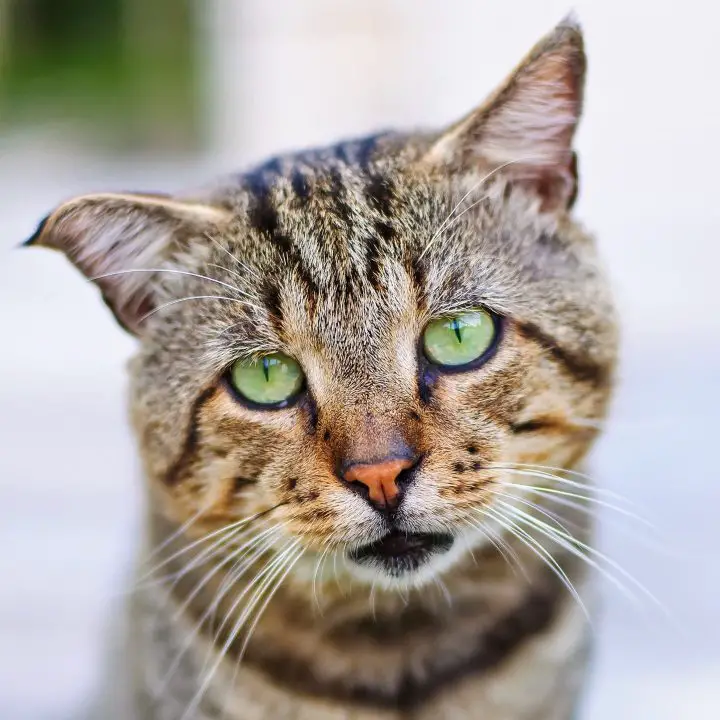
Other Potential Reasons a Cat May Not Be Eating Much
There are a few other potential reasons to consider when you’re trying to figure out what has caused your cat’s loss of appetite. Some of these may require a visit to the vet, while others may be easier to address by changing a few things at home.
Being a Picky Eater or Bored with Current Food
If you notice your cat asking for food but not eating, they may just not be happy with their current food. Cats can be picky eaters and may not enjoy the food you’re serving. If you’ve recently switched to a new brand or new flavor, they may not be happy with the switch.
Even if you haven’t recently switched foods, it is also possible that your cat is getting bored with their current food. If you notice that they are still interested in treats or other types of food, boredom could be the culprit.
Age
If you’ve even wondered, “do cats eat less as they grow older,” the answer is often yes. A cat’s sense of taste and smell (along with their other senses) can weaken with age. With a weakened sense of taste and smell, your cat won’t enjoy eating their food as much as they used to, so they may stop eating or start eating a lot less.
When do cats start eating less? This can vary for each cat. However, when cats turn seven, they are considered seniors due to the various physical changes their bodies go through, which can often include a change in their senses.
It is important to note that a medical condition is more likely to be the reason your cat stopped eating, rather than just them simply getting older. Even if your cat is a senior, you still may want to bring them in for a checkup with their veterinarian.
Recent Vaccination
Some vaccines can cause a temporary decrease or loss of appetite in cats. If your cat recently received a vaccination, this may be the reason they have stopped eating. In most cases, any vaccine side effects should only last for a few days. If your cat still hasn’t regained his appetite after this time, contact the veterinarian.
Medication Side Effects
Like vaccines, the side effects of some medications can also cause a decrease in appetite. If you noticed the change in appetite after starting a new medication, contact the veterinarian to discuss your options. You should not, however, simply discontinue the use of the medication without talking to the vet, as it could be detrimental for your cat’s help.
Finding Other Food Sources
If you have an outdoor cat, they may be finding food to eat outside. When you offer them their daily meals inside, they could be full from what they already ate.
Hairballs
In some cases, hairballs can also cause a cat to stop eating. When the fur accumulates in the stomach, it may cause a cat to feel full. If your cat feels full, it makes sense that they won’t want to eat their normal meals.
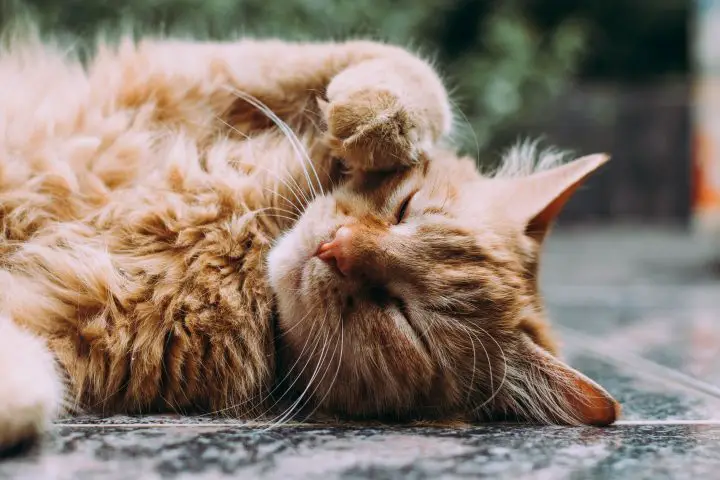
How long can a cat go without eating?
Can a cat go 48 hours without food? What about even longer periods of time than that? In some cases, cats can survive for up to two weeks without food. However, going this long without eating will yield very negative health consequences.
Most cats should be able to go two or three days without eating before their body starts to access their fat reserves.
Making sure a cat is drinking enough water is also important. After a few days without water, the cat is in serious danger of very negative health consequences.
Determining the Cause of Your Cat’s Decreased Appetite
Do cats appetites decrease with age? Is my cat not eating because he is sick, stressed, or anxious? Now that you have learned some of the reasons a cat may stop eating, you are probably eager to determine which reason is behind your kitty’s loss of appetite. While some of the reasons above can be easier to pinpoint, such as getting bored with their food, others will require a veterinary exam and diagnosis.
In the next few sections, I’ll share a few things you can try to get your cat to start eating more. However, if the reason they aren’t eating is due to a health condition, these suggestions likely won’t make much difference. You’ll need to bring your cat to the vet as soon as possible for a checkup.
How to Get Your Cat to Start Eating Again
The best way to get your cat to start eating again will vary based on the specific reason your cat isn’t eating. If you are unsure why your cat has stopped eating, you should work with their vet to determine the underlying reason. Treating the cause may help them get back their appetite.
Below are a few suggestions that you may find helpful for some cats who appear to be picky eaters, bored with their current food, or possibly even those dealing with some stress and anxiety. Again, most of these suggestions may not be effective for cats with medical conditions since their medical condition will need to be addressed to help them regain their appetite
Try a New Food
If you believe your cat doesn’t like the food you’re feeding them or may have become bored with their food, switching to something else may help them start eating again.
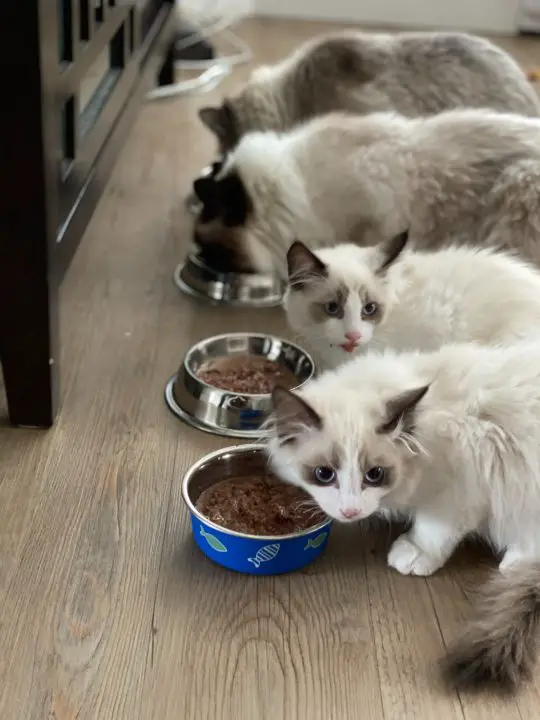
Switch to Wet Food
What do you feed a cat that refuses to eat? Many owners have found success switching to wet food. Many cats prefer the more flavorful taste and aromatic scent of wet food over dry kibble. If this is the case for your kitty, offering wet food may help them start eating again.
Additionally, wet food may also be a good choice for cats with dental issues. It is easier to chew than dry kibble. However, keep in mind that wet food may cause more dental problems because it doesn’t help keep a cat’s teeth clean in the same way dry kibble does. Try to brush your cat’s teeth a few times a week if you switch to wet food.
Try Offering Food at Different Times
If you only offer food at the same time each day, you may simply be catching your cat during naptime or when they aren’t hungry. Try offering meals at other times throughout the day to see if your cat is a bit more interested.
Help Cat to Feel Less Stressed and Anxious
If your cat isn’t eating due to stress or anxiety, take steps to help them feel better. A few tips to help decrease your cat’s stress include:
- Setting up a few perches or cat trees around the house
- Making sure there are a few safe hiding spaces available
- Giving your cat plenty of love and attention
- Working in extra time to play with your cat
- Keeping the litter box clean and setting up a few additional litter boxes
Try an Appetite Stimulant
Will a cat starve itself to death? In some cases, they may. If you are really worried about your cat starving, seek immediate help from your veterinarian. They may recommend an appetite stimulant.
Food Toppers
When a cat not eating food but eats treats, they may enjoy having a food topper added to their food. Treats are more flavorful than standard cat food, and your cat may just not like the taste of their food. Adding a topper can help make their meals more flavorful and enjoyable.
Spoon Feeding
Some cats who aren’t eating out of their bowls may be more receptive to being spoon-fed. Warm up some canned cat food or even chicken baby food. Then, offer it to your cat on the spoon. Just keep in mind that this is not meant to be a long-term solution, but may be your only option if your cat really isn’t feeling well.
Home-Cooked Meals
If your cat doesn’t seem interested in dry kibble or wet food, consider cooking a few meals for them yourself. Choose simple, kitty-safe ingredients and do not add any seasonings or spices. Many spices that we often use, such as garlic and onion, are not safe for cats.
This video will help see what you’ll need to make a home-cooked meal for your kitty.
Appetite Changes in Your Cat
There are many possible explanations for why a cat has stopped eating but appears to be acting normal otherwise. Hopefully, reading through the information I’ve shared has helped you gain some insight into what is happening with your kitty. If you are concerned about any health concerns, you should schedule an appointment with your cat’s veterinarian to have her checked out. Your vet can also offer additional advice to help get your cat to start eating again.
FAQs
A few natural appetite stimulants you can try include catnip, canned cat food and/or food toppers, and increasing the amount of playtime your kitty gets. Your vet may also be able to provide a prescription for an appetite stimulant if they feel it is necessary.
If your cat isn’t eating, your first step should be to determine why they aren’t eating. Schedule a checkup with the vet to see if there is an underlying medical condition that is suppressing their appetite. Once you’ve diagnosed the underlying condition, a few things you can try to help your cat start eating more include switching to a new or canned food, warming up their food, preparing home-cooked meals, offering meals at different times throughout the day, and giving your cat more attention to help him feel less stressed or anxious.





